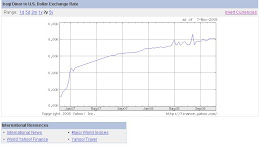A local company on Wednesday initiated a project to treat rain water and to maintain sewage stations in Basra province at a cost of almost one billion Iraqi dinars, an official source said.
“The project includes rehabilitation work on rain water networks to prevent flooding during winter…,” an official source from Basra’s sewage department, Engineer Hazem Mohammed, told Aswat al-Iraq
“The project will be financed by Basra’s reconstruction and services support committee and supervised by the local sewage department,” Mohammed noted, adding that the scheduled completion period is four months.
The committee, presided over by the minister of state for parliamentary affairs, Safaa al-Din al-Safi, was set up in synchronization with the commencement of Operation Saulat al-Fursan (Knights’ Assault) in late March.
Basra, 590 km (340 miles) south of the Iraqi capital Baghdad, has an estimated metropolitan population of 2,300,000 in 2008.
Basra, a Shiite province with 20 percent of the population are Sunnis, is the cradle of the first civilization of Sumer. It has the seven main Iraqi ports. The first built in Islam 14 A.H. (After Hegira), the city played an important role in early Islamic history.
The area surrounding Basra has substantial petroleum resources and many oil wells. The city’s oil refinery has a production capacity of about 140,000 barrels per day (bpd).
The only Iraqi outlet to the sea, Basra is in a fertile agricultural region, with major products including rice, maize corn, barley, pearl millet, wheat and dates as well as livestock.
A network of canals flowed through the city, giving it the nickname “The Venice of the Middle East” at least at high tide.
The only Iraqi outlet to the sea, Basra has the commercial ports of Iraq.
(Voices of Iraq)

